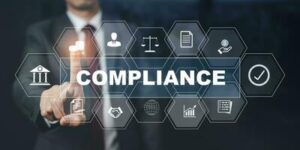
Understanding HR Compliance and Its Legal Importance
HR compliance is a critical aspect of managing a workforce, ensuring that companies adhere to labor laws, workplace regulations, and ethical guidelines. Businesses must follow these legal frameworks to avoid penalties and maintain fair treatment of employees. Non-compliance can result in lawsuits, financial losses, and reputational damage. By integrating compliance strategies, companies can create a structured and legally sound work environment that safeguards both employers and employees.
Organizations must understand that compliance is not a one-time requirement but an ongoing process. Laws governing employment practices change frequently, requiring HR teams to stay updated on new policies and ensure their workplace remains compliant. Proper documentation, record-keeping, and adherence to policies help prevent legal issues from arising. Businesses that prioritize compliance reduce the risk of penalties and foster a trustworthy and professional workplace.
Common HR Compliance Challenges and Risks
One of the biggest risks companies face is failing to meet HR compliance requirements related to employee rights, wages, and workplace safety. This can lead to lawsuits, government investigations, and financial fines. Understanding these challenges allows businesses to implement effective measures that prevent legal violations.
Wage and hour violations are common compliance pitfalls. Employers must ensure fair compensation, overtime pay, and accurate working hours to avoid disputes. Misclassification of employees, whether as independent contractors or full-time staff, can lead to serious legal consequences. Employers must also stay vigilant about discrimination and harassment policies to ensure a fair and equal workplace.
Additionally, workplace safety regulations require companies to maintain a hazard-free environment. Businesses must comply with health and safety standards, provide necessary training, and address potential workplace hazards. Failure to comply with these laws can lead to fines and liability claims. Data privacy regulations are also becoming increasingly important, requiring HR departments to handle employee information securely and in compliance with relevant laws.
Employee Rights and Workplace Policies
HR compliance extends beyond legal frameworks to include well-defined workplace policies that protect employee rights. Clear guidelines on discrimination, equal opportunity, and workplace behavior help create a professional work culture. Companies must establish policies addressing workplace harassment, employee grievances, and ethical conduct to maintain compliance with labor laws.
A well-structured employee handbook is an essential tool for compliance. It outlines company policies, expectations, and legal rights, ensuring that employees understand workplace rules. Companies must also provide anti-harassment training, establish reporting mechanisms, and enforce disciplinary measures for violations. By fostering a respectful workplace, businesses can minimize legal risks and create a safe, inclusive environment for all employees.
The Role of Documentation in Compliance
Accurate documentation is a fundamental component of HR compliance. Keeping records of employee contracts, performance evaluations, and workplace incidents helps businesses prove their adherence to labor laws. Proper documentation also protects companies in case of legal disputes or audits, providing evidence that policies were followed correctly.
HR teams must maintain updated records of employee classifications, payroll information, and disciplinary actions. Regular audits and reviews ensure that compliance documentation remains accurate and aligns with legal requirements. By keeping thorough and organized records, businesses can demonstrate their commitment to compliance and mitigate potential risks.
Training and Awareness to Prevent Compliance Violations
Ensuring that both management and employees understand HR compliance is crucial for preventing legal pitfalls. Regular training sessions help educate staff on workplace policies, legal responsibilities, and ethical behavior. By providing compliance training, companies reduce the likelihood of accidental violations and create a workforce that is aware of its rights and obligations.
Training programs should cover key areas such as workplace safety, data protection, and anti-discrimination policies. Online platforms and digital resources can also help businesses provide accessible compliance education to employees. Encouraging a culture of awareness ensures that all staff members understand their role in maintaining a legally compliant workplace.
The Future of HR Compliance and Evolving Regulations
The legal landscape for HR compliance continues to evolve, with new regulations emerging in response to changing workplace dynamics. Remote work, digital security, and diversity initiatives are becoming key compliance areas that businesses must address. Companies that proactively adapt to these changes will avoid legal risks and create stronger, more compliant work environments.
Remote work presents unique compliance challenges, such as tracking employee hours, ensuring fair compensation, and maintaining cybersecurity standards. Businesses must establish policies that address these concerns while providing equal opportunities for remote workers. Additionally, diversity and inclusion initiatives are gaining importance, requiring organizations to implement fair hiring and workplace policies that prevent discrimination and bias.
Conclusion
HR compliance is a crucial aspect of business management that helps companies operate within legal boundaries while maintaining a fair and ethical workplace. By understanding legal requirements, addressing compliance challenges, and implementing effective policies, businesses can prevent costly fines and legal disputes. Regular training, thorough documentation, and a commitment to evolving regulations ensure that organizations remain compliant in an ever-changing legal landscape. Prioritizing HR compliance not only protects businesses from legal risks but also fosters a professional and inclusive work environment for employees.
